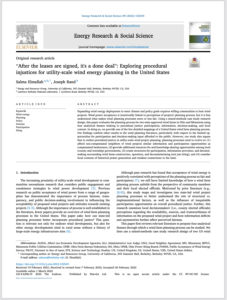Full Title: “After the Leases are Signed, it's a Done Deal”: Exploring Procedural Injustices for Utility-Scale Wind Energy Planning in the United States
Author(s): Salma Elmallah, Joseph Rand
Publisher(s): Energy Research & Social Science
Publication Date: March 1, 2022
Full Text: Download Resource
Description (excerpt):
Expanding wind energy deployment to meet climate and policy goals requires willing communities to host wind projects. Wind power acceptance is inextricably linked to perceptions of projects’ planning process, but it is less understood what makes wind planning processes more or less fair. Using a mixed-methods case study research design, this paper evaluates the planning process for two state-approved wind farms in Ohio and Minnesota using four analytical themes relating to procedural justice: participation, information, decision-making, and local context. In doing so, we provide one of the few detailed mappings of a United States wind farm planning process. Our findings confirm other results in the wind planning literature, particularly with respect to the limited opportunities for participation and decision-making input afforded to the public. However, our study also argues that to realize procedural justice in utility-scale wind project planning, planning processes need to evolve to: (1) afford non-compensated neighbors of wind projects similar information and participation opportunities as compensated landowners, (2) provide additional resources for and knowledge-sharing opportunities among local (county and township) governments, (3) create structures for participation, information provision, and decision-making surrounding wind farm construction, operation, and decommissioning (not just siting), and (4) consider local contexts of historical power generation and resident connections to the land.
